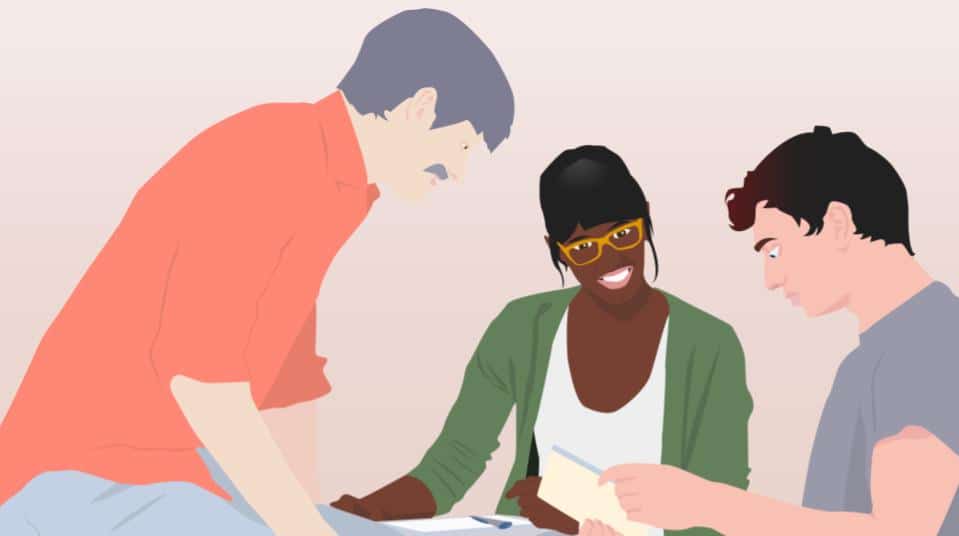April 29, 2024
Overcoming Exam Phobia: How to Manage Test Anxiety
Written by Guest Author
Posted in Anxiety and with tags: Anxiety, anxiety in teens, school

Most people are a little nervous before exam situations. The pressure is on, the outcome may determine your further path in education or work, and the doubts and worries can easily become overwhelming. If the nervousness spirals into severe exam phobia, it not only affects exam performance but can lead to long-term health problems like depression. The good news is, test anxiety can be combated with a range of strategies you can try yourself.
Being nervous before a test or an important exam can be normal. After all, this is an important situation that may have an influence on your grades or career path. The stakes are high, and you’re under pressure to perform well.
For some people, however, it’s not just “being nervous.” When faced with test situations, they experience severe anxiety or even debilitating panic attacks.
What Is Exam Phobia, and How Does It Compare to Fear and Anxiety?
Fear is a normal biological response to danger. In an exam situation, typically, test-takers are not under any imminent physical threats, and the outcome of the exam is still open. Feelings of intense fear in this context are often rather an expression of anxiety or a phobia.
Anxiety is fear or worry over an unidentified or vague threat that may or may not actually occur. A phobia is a type of anxiety disorder where affected persons feel extreme irrational fear around something that does not objectively pose enough of a threat to warrant the excessive fear. Well-known examples are the fear of heights (acrophobia), the fear of spiders (arachnophobia), or the fear of flying (aerophobia).
When it comes to exam situations, some people experience extreme feelings of stress and anxiety that reach the levels you see in phobias. This is called exam phobia, examophobia, or “the fear of exams.”

Symptoms and Consequences of Exam Phobia
Acute and Physical Symptoms
The symptoms of exam phobia are similar as in other anxiety and panic disorders. They can include:
- Shaking
- Rapid heartbeat
- Headaches
- Excessive sweating
- Nausea, vomiting, or diarrhea
- Feeling dizzy or lightheaded
- In panic attacks: may feel like dying, having a heart attack, or being unable to breathe
Longer-term Symptoms
If you are experiencing exam phobia, you probably already notice symptoms leading up to the exam. High levels of stress, rumination, and difficulty concentrating are common. The upcoming exam can take over your thoughts, lead to sleepless nights and make any kind of exam preparation much more difficult.
Understandably, it is hard to stay organized and focused on studying if your mind circles around “What if I fail?” or “I will never be able to do this.”
Repeatedly dealing with high anxiety around exams and suffering the consequences can have deeper effects. Every exam that did not go well because concentrating was just impossible in a state of fear can feel like another failure, another confirmation of the fears.
It can be a blow to your self-esteem, making you feel inadequate and hopeless, and over time can lead to depression. Some people will socially withdraw, and anxiety issues may worsen.
Avoidance Behaviors
Avoidance behaviors are common with anxiety disorders. Understandably, if something causes you intense fear, you don’t want to be near it. Avoidance can look like finding excuses on exam day or even skipping entire courses.
If your exam fear is severe, you may even avoid studying and thinking about the exam at all: Procrastination is a common problem related to exam fear. Unfortunately, procrastinating and avoiding proper exam preparation will make you feel unprepared and make the fear worse as exam day comes closer. So, it’s important to catch and stop this cycle early on.
Underperforming in Exams
During an exam, the symptoms can negatively affect test performance. If you are severely stressed, have physical symptoms of anxiety, or your thoughts are occupied by being frozen in fear, it is possible you’ll have a hard time focusing. Some people even completely blank on what they studied.
Not only do such negative experiences worsen the fear in the future, but the exam will also be an inaccurate assessment of your true ability, as your performance was impaired during the exam and preparation.
If you notice that this keeps you from achieving your dreams, make sure to find help to work on your exam phobia! You deserve the success you work hard for, and exam anxiety should not be a hurdle. To tackle this, let’s first look at why people experience exam phobia.
What Are the Causes of Exam Phobia?
The main component of exam phobia is the fear of failure. This can be caused internally or externally.
External Factors
Strict parents that expect good grades, a critical employer that expects good performance on an exam, or not wanting to disappoint people who hope for a good outcome are possible external factors.

Internal Factors
Internal factors include personality predispositions like being perfectionistic, having low self-esteem, needing a lot of control and security, or defining one’s value based on the exam performance. All of these can make it more likely that exam situations cause you an excessive amount of stress.
How to Alleviate Exam Fear
The best way to be less scared of exams is to learn to accept failure. If you give up the need to control the outcome, rely on yourself to give the best you can and feel confident in your ability to work through even negative outcomes, the pressure and uncertainty feel less daunting.
Of course, this is easier said than done! Below are some concrete strategies on how you can combat exam anxiety.
Build Self-Esteem Outside of Exam Performance
If your feeling of self-worth hinges on the outcome of the exam, the idea of failure has a magnitude that maybe one examination does not deserve. It’s okay to not be perfect at everything. Work on building self-worth outside of exam performance and cultivate positive self-talk.
You can improve your self-esteem by becoming aware of how you talk to yourself, and which negative beliefs are affecting you: What are you telling yourself about yourself? We often are our own worst critic. Examples of common negative thought patterns are:
- “I failed at this, so I am a failure.”
- “I don’t understand this topic, so I will fail the exams and should not be in this program at all.”
- “I’m feeling overwhelmed, so I’ll never be able to do this.”
Challenge these negative, black-and-white thoughts and practice speaking to yourself with respect and kindness. In the long run, it will make you more resilient to challenges and reduce the impact an exam can have on you.
It can also help to remind yourself of all the things you are good at outside of what the exam is about. Your hobbies, interests, other subjects, personality – all these are parts of you that you can be proud of, and consciously recalling them can help you see that your worth is not determined by the testing situation.
Start Studying Early and Stick to a Schedule
Procrastination is extremely common, not just for people who suffer from heightened exam anxiety. It can, however, make anxiety worse: The more you postpone properly studying for the test, the less prepared you will feel and the more reason your anxiety has to get out of control.
The best way to combat this is to study strategically and start early. Avoid cramming and instead have a plan in place long enough before exam day that details exactly what you will be studying and when. That plan will ensure that
- You can rest assured you’ve covered everything you need to study for the exam
- You don’t get lost and overwhelmed as easily when studying since each session has a smaller, achievable goal

Following your study schedule ensures that when you walk into the exam, you won’t come out of endless desperate nights of last-minute study, but you will know that you did your best. You followed the plan you set up to be able to pass this exam, and now you will merely apply it.
This leaves less room for making up worst-case scenarios, brings more structure into your approach, and gives you something organized and structured to look back on that gives you more confidence on exam day.
Manage Stress Before It Is Too Late
Continuously monitoring your stress levels and keeping them low can help make you more resilient to stressful events like an upcoming exam, and can also help calm you down immediately beforehand. Tried and true methods include:
- Take care of your body – movement, healthy food, enough sleep
- Make sure to maintain social contacts and do not isolate
- Use the 3-3-3 rule: In an acutely stressful situation, look around you and identify 3 objects, then listen for 3 sounds. Then, move 3 body parts. Many people find this exercise calming and grounding in acute anxiety moments.
Create Habits That Give You Security
Outside of getting proper sleep, getting exercise, and following a study schedule, you can think about introducing small habits or rituals before exams that make you feel safe and remind you of your abilities.
Examples could be getting your favorite food the night before a test, taking five minutes of fresh air outside and listening to the birds, or journaling about all your achievements in life that have nothing to do with exams. This keeps you from spiraling and can help you walk into the exam more grounded.
Share Your Worries and Seek Support
It’s important to not compare yourself to others, especially if you feel like that makes you feel more pressured. However, connecting with others and sharing the anxiety about an upcoming test with a group of people in the same boat can help tremendously. It will likely show that everyone is nervous to a degree and that you’re not alone.
Studying together and sharing worries also helps put things in perspective – how much of the fear is truly warranted, and how much is excessive? Communicating with peers can help even out how you feel, keep you from imagining worst-case scenarios on your own, and give you more security. It will also give you a realistic gauge of your knowledge level. Very likely, the others don’t know everything either!

Get Professional Help
The step to getting professional help is difficult for many, with some worrying about stigma, being unsure about what it will be like, or for organizational or financial reasons. However, if your fear of exams seriously impacts your life, it may be time to take that step.
Working with a therapist can help you understand the mechanisms of the anxiety, and teach you concrete methods on how to overcome them that are geared to you personally. Check back with your school or workplace, as some collaborate with mental health services to provide counseling.
One of the most common and effective types of therapy that helps with anxiety disorders is cognitive-behavioral therapy (CBT), which works by identifying faulty belief systems and assumptions and replacing them with healthier, more productive alternatives.
Final Thoughts
Anxiety disorders are incredibly common and can have a tremendous impact on people’s quality of life. Exam phobia can seriously inhibit one’s career or education. But it is not as hopeless as it feels: Anxiety can be treated, not just by working with a mental health professional, but by taking concrete steps on your own to promote resilience and self-esteem. I wish you all the best!
Author:

Anke Rüb
Anke is passionate about medicine and learning science. She’s a content manager at Lecturio, where she works with a team developing new tech solutions that help medical and nursing students learn efficiently and succeed in school and their careers.
5 Ways to Reduce Anxiety
Get instant access to your free ebook.
Grounding & Self Soothing
Get instant access to your free ebook.
Create Healthier Thoughts & Feelings
Get instant access to your free ebook.
Why You Feel This Way
Get instant access to your free ebook.
















